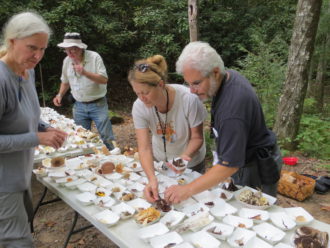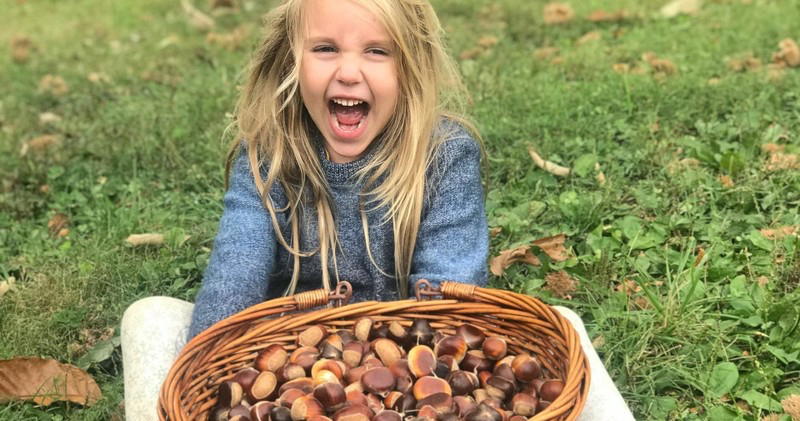Heading into the woods and fields to hunt for wild edibles has developed into both a popular pastime and a viable revenue stream for many in Western North Carolina. But in the age of coronavirus quarantine, with stay-home orders, supply-chain worries and a piqued interest in self-sufficiency, there are new considerations — and challenges — for the ancient practice of foraging.
Although gleaning dinner from nature inherently offers some freedom from the social framework, COVID-19’s disruptions still reached many locals who normally take to the outdoors in spring to gather ramps, morels and other seasonal morsels. Government-mandated park and trail closures forced the Asheville Mushroom Club, which has led mushroom-hunting outings and other fungus-focused activities since 1983, to cancel its popular foraging forays. “It is more difficult to get permits for large groups at the moment,” says club President Suzie Berryhill.
Locked out
Berryhill points out that foraging beginners, who often stick to major trails, felt the biggest impact from the closures. Many professional foragers, she says, were better off because they could rely on secret spots not dependent on popular access points.
But even longtime pro forager and educator Alan Muskat, founder of the Asheville-based No Taste Like Home foraging tour company, still found himself in a jam this spring. “I could not get to my ramps place,” he says. “At first, I had to get into it from a different road that hadn’t been closed, and I basically bushwhacked using my GPS to find my spot. But then the other road closed, too.”
Fortunately, Muskat was able access his hidden site long enough to collect plenty of the prized wild onions to preserve for his annual stash. “But I know a chef who had trouble getting his ramps himself because of the closures,” he says. “I would imagine that, commercially, even the restaurants didn’t get that stuff. Of course, they were closed down, but they often will get enough for the whole year and then put it up.”
And Doug Elliott, a Rutherford County-based herbalist and storyteller who has been studying, writing and teaching about wild plants since the 1970s, suggests that the shutdowns may have put some foragers off altogether. “I talked to one friend who was planning on doing a pretty serious foraging adventure and was wanting to go out for a month or so and had to cancel it because everything was closed,” he says.
Berryhill notes that restaurant closures may have presented a bigger challenge for some professional foragers than did limited trail accessibility. “One restaurant supplier I know who sells both foraged and grown mushrooms said restaurants that were open had reduced orders and were rejecting high-end mushrooms, like foraged morels and chestnut mushrooms, because of cost,” she says. “It is going to take a while for the industry to recover, and that effect flows down the supply chain in ways people don’t expect.”
Nibbles and bites

With North Carolina now in the second phase of Gov. Roy Cooper’s three-phase reopening plan, the Asheville Mushroom Club’s board of directors has scheduled a meeting this month to discuss the status of its forays, with the hope that they can be relaunched in some format in the near future. “We are erring on the side of caution as many of our members are in high-risk populations due to age or health,” Berryhill explains.
Until in-person activities resume, the club is offering virtual monthly programs to members and producing educational videos and articles to offer via its website. The monthly AMC newsletter also provides guidance and updated information for independent foraging expeditions.
The AMC’s new online offerings have found a broad and eager audience. Berryhill says membership has grown in recent months, although she can’t say for sure that the upswing is related to COVID-19. “Our membership spike usually hits in late February, just before morel season,” she says. “We have had steady increases for the last few years. I think people are wanting to know where their food comes from, as well as get outside and understand nature a bit better.”
No Taste Like Home’s foraging tours were shut down from mid-March until late May, when the state allowed small group gatherings to resume. But Rebeka Jopling, the company’s managing director, says there’s been a “surge of interest” since those tours relaunched.
“While we are at about a third of sales for the same time period last year, tourism sales were expected to be closer to 0% for June and only 20% in July. So we seem to be doing better than expected for the industry in Asheville,” she reports.
During the weeks of lockdown when locals were hunkered down, Jopling says, No Taste Like Home received inquiries about no-contact and at-home tour options. And Muskat saw an opportunity for his company, which normally caters primarily to tourists, to create a new program offering wild-food knowledge literally at locals’ doorsteps.
Beta-tested in April and May, the What’s in My Yard? service brings expert foragers to a client’s home to locate and label a minimum of a dozen wild edibles, as well as toxic plant and mushroom species that should be avoided. Included in the pay-what-you-can survey is a “treasure map” and list that show where each item can be found on the property.
From there, clients can opt to purchase a $200 contact-free foraging tour of their yard with an expert who will provide detailed discussion about identification and uses for individual items. “People certainly love the yard survey idea,” says Muskat. “What we’ve done so far has been very well received.”
Regular foraging tours, where the educators are familiar with the location and can be sure of finding a good selection of specimens, have their advantages, Muskat admits. But the yard-based program has benefits that have surprised him.
“Here, there’s the opportunity for familiarity that only comes with practice,” Muskat explains. “When it’s right there, you not only have more motivation, you also have more opportunity to see things over and over, rather than it being basically a one-time thing.”
Food for thought
Muskat is offering the yard survey on a sliding scale, a test of the model for broader use as part of the “hunter-gatherer mentality” his business espouses. Foraging, as he sees it, is about more than individual survival; it has the potential to inspire a collective transition to a more equitable and sustainable society.
“Hunter-gatherers are well-known for being fiercely egalitarian. That’s why they’re known for sharing, not hoarding,” Muskat says. “Foraging, then, in this spirit, isn’t just a pleasant pastime: It’s a radical act.”
And this summer, when physically avoiding others is for the greater good, seeking sustenance outdoors could be the ideal activity from both an individual and community standpoint. “This is great for social distancing and increases an interest in what is observed outside,” Berryhill says.
“It seems like one of the safest things you can do is be out in the woods in the fresh air, or in the fields and wandering around,” notes Elliott. Mulberries are nearly ripe, he points out; elderberries are blooming, and blackberries and raspberries should be ready in about a week. “It’s even a way you can hang out with someone and be in nature and stay 6 feet apart and know that you’re probably in the safest place you can be.”
For updates on the Asheville Mushroom Club’s forays and other programs, visit ashevillemushroomclub.org. Details about No Taste Like Home’s tours and services can be found at notastelikehome.org.




Before you comment
The comments section is here to provide a platform for civil dialogue on the issues we face together as a local community. Xpress is committed to offering this platform for all voices, but when the tone of the discussion gets nasty or strays off topic, we believe many people choose not to participate. Xpress editors are determined to moderate comments to ensure a constructive interchange is maintained. All comments judged not to be in keeping with the spirit of civil discourse will be removed and repeat violators will be banned. See here for our terms of service. Thank you for being part of this effort to promote respectful discussion.